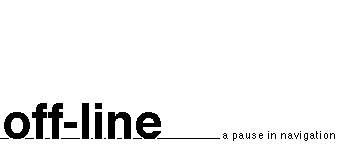I don’t feel comfortable making predictions. But someone
took the risk. And he is one of the most brilliant writers
about the internet. On January 2, in his article
Predictions
for 2002, Gerry McGovern explained ten things that he expects
to happen this year. Here they are – with a few comments.
1. Although the worst is probably over, there will be no
major recovery in 2002. Things will stabilize during the
first half of the year, with modest gains from there on.
That makes sense – though there can be no
“certainties.” But there is an interesting side to
uncertainty and widespread concern. When everyone else is
hesitant and confused, there are remarkable opportunities for
those who have the dedication and the consistency to work
with clear strategies and flexible tactics, to learn from
experience, and to plan for “medium or long term”
results.
2. This will be the year of the virus. Security will
become an ever-increasing concern.
I wonder. There are over 50,000 viruses “in the
wild” – and when harm is done it’s caused almost
invariably by software bugs or lack of proper defenses.
People and companies just need to be a bit more careful (and
to avoid spreading hoaxes and false alerts, of which there
seem to be more around than there are real viruses).
3. There will be increasing calls for comprehensive
internet legislation, as the Internet becomes more critical
to the lives of millions. Copyright, crime and terrorism will
be the focus of much legislation.
I think this, unfortunately, is true. And experience
shows (especially in my country) that most of the legislation
and regulation does more harm than good.
One of the dangerous “side effects”
of terrorism is that it becomes an excuse for countless
violations of freedom and privacy that are of no use for the
prevention of crime but serve the selfish interests of power
groups – public and private.
4. Spam will continue to be a major problem, and will be
one of the key reasons people will want a more regulated
internet.
Alas – it’s true. And it’s very unlikely that
regulation will solve the problem. It could make online
activity unnecessarily complicated for all of us, while
spammers continue to clutter our mailboxes.
5. Bankruptcies, mergers and consolidation will continue.
More people will go to fewer websites, as the internet
becomes controlled by a few mega-corporations.
That’s very likely. Even though mergers and acquisitions
do more harm than good (and un-merging is often the best
solution to improve efficiency, though such events don’t make
big headlines as the mergers do.) Attempts to
“centralize” the net will continue, and
unfortunately in part they will succeed – though they are the
opposite of what the net is and needs to be.
6. The PC crisis will continue. For a significant
percentage of the population there will be no compelling
reason to buy a PC. For those that have one, there will be
few compelling reasons to upgrade.
That trend has been visible for quite a while – and let’s
hope it gets stronger. Not only in the case of hardware, but also
to discourage the unnecessary, cumbersome and expensive
software upgrades.
7. The wireless and telecommunications sector will
continue to flounder. Too much cost, too much hype and too
little demand for all these wonderful extra services, will
badly hurt these industries in 2002.
We haven’t yet seen the real collapse, that has to come
in a now “mature” and saturated market. Gimmicks
and paraphernalia can’t keep it afloat forever.
8. A two-tier internet will clearly emerge: for-free and
for-fee.
This is quite complicated, and I think a clear-cut and
reasonable distinction is unlikely to come in a short while.
Of course it’s perfectly reasonable that some things should
be “for free” and others “for fee”. But
it won’t be easy to sort out which, why and how.
9. Information architecture will become the crucial
discipline in website design. This means a greater focus on getting
your metadata, classification, navigation and search right.
Sooner or later, it has to happen – or so I hope. But the
silly habit of placing appearance over content doesn’t seem
to be declining. And there is a problem: playing with flashy
surface is cheap and easy. Providing valuable content needs a lot
of hard work and good talent – and it’s a never-ending task.
10. Amazon.com will make a profit.
Apparently it’s already happened. But there is much more
to this than the financial health of one company. For seven
years Amazon has been a consistent success in the
marketplace. A clear example of how to build a sound customer
base – which, if managed with care, is a large and valuable
asset. The fact is that many people, who gloated in Amazon’s
lack of profit, are scared. Because they don’t want (or don’t
know how) to be serious about service and customer care.



